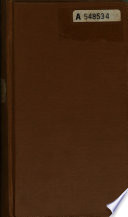 | Solomon Lowe - Arithmetic - 1749 - 334 pages
.../. (3) The number of terms, n. (4) The common difference, J. (5) The fum of all the terms, s : (II) any three of which being given, the other two may be found : as may be feen in a feries of 20 proportions in Oughtred's clavis math. 29. 4. Seealfo Malcolm, arithm.... | |
 | Solomon Lowe - Arithmetic - 1749 - 336 pages
.../. (3) The number of terms, ». (4) The common difference, d. (5) The fum of all the terms, s : (II) any three of which being given, the other two may be found : as may be feen in a feries of 20 propofitions in Oughtred's clavis math. 29. 4. Seealfo Malcolm,... | |
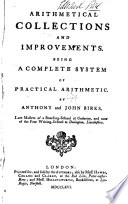 | Anthony Birks, John Birks - Arithmetic - 1766 - 640 pages
...AIfo42 . 35 . 28 . 2i . 14. 7¿ common difference 7. In an arithmetical progreffion are five things ; any three of which being given, the other two may be found, which admit of twenty different propofitions, Çhap. V. ARITHMETICAL PROGRESSION. д. The firft term,... | |
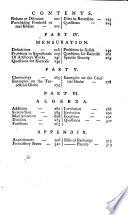 | Charles Vyse - Arithmetic - 1785 - 350 pages
...The Number of Terms. 5. The Aggregate or Sum of all the Terms. 4. The common Excefs or Difference. Any three of which being given, the other two may be found. PRO- I « PR-O POSITION I. When two Extremes and the Number ,of Terms are given, to find the Sum of... | |
 | John Thomas Hope - Arithmetic - 1790 - 430 pages
...2. Alfo 42, 35,28,21, 14, 7, common difference 7. In an Arithmetical Progreffion are five tiling«, any three of which being given the other two may be found,' which admit of twenty different proportions. 2d, The laft term commonly the I extremes, greateft I... | |
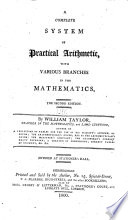 | William Taylor (teacher of the mathematics.) - Arithmetic - 1800 - 556 pages
...greateft. 3. The number of terms. 4. The common excefs, or difference. 5. The aggregate, or fum of all the terms. Any three of which being given, the other two may be eafily found, PROPOSITION i. When the two extremes, and the number of terms aie given, to find the... | |
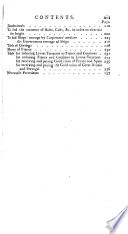 | Michael Walsh - Arithmetic - 1801 - 268 pages
...term. 2. -The laft term. 3. The numb т of terms. 5. The fum of all the terms. 4. The equal difference. Any three of which being given, the other two may be found, Tfießrß. Jícond and third term given toßnd thejtfth. RULE. Multiply the fum of the two extremes... | |
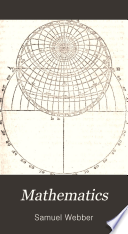 | Mathematics - 1801 - 658 pages
...Problem, are the latitude of the place, and the sun's altitude, declination, and azimuth, and the hour ; any three of which being given, the other two may be found by the solution of an obliqiie spherical triangle. Hence several useful Problems are formed, three... | |
 | Michael Walsh - Arithmetic - 1803 - 284 pages
...jujt term. 3. The hist term. .3. 'The number of .terms. A. The equal ditìercnce. 4- Xbe sura of all the terms. Any three of which being given, the other two may .be found. Theßrst, fécond and tinnì term giren to find thejtfth. RvLE. Multiply the sum of the two ewtpemcs... | |
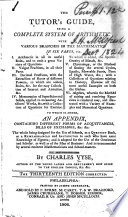 | Charles Vyse - Arithmetic - 1806 - 342 pages
...last Term." 3. The Number of Terms. 4. The common Excess or Difference. 5. The Aggregate Sum of all the Terms. Any three of which being given, the other two may be found. PROPOSITION I. RULE. Multiply the Sum of -J the two Extremes into the Number •f Terms, and divide... | |
| |